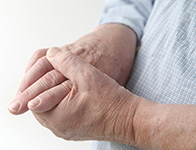By Greg Arnold, DC, CSCS. Eight weeks of daily supplementation with 6000 mg of Korean red ginseng significantly reduced symptoms of cold sensitivity in the 40 participating South Korean women.
Cold hypersensitivity in the hands and feet is a condition characterized by feeling “excessively cold” at low temperatures due to excessive narrowing (“vasoconstriction”) of blood vessels in the hand and feet 1. This cold hypersensitivity can have a very detrimental effect on quality of life 2 but a cause has not been confirmed for this excessive vasoconstriction 1. Few treatment options are available, although behavioral modification is a common approach 3.
A 2014 study out of South Korea 4, involved 80 women between the ages of 38 and 52. They received either 6,000 milligrams of Korean Red Ginseng powder, taken as six capsules (500 milligrams per capsule) (40 women) or placebo (40 women) twice daily for 8 weeks. Before the study began and at 4 and 8 weeks, while their skin temperature was measured using infrared thermography, each subject provided subjective feedback with a visual analog scale ranging from 0 (no pain) to 100 (“most intense discomfort”). They also completed a 36-item quality of life questionnaire 5.
After 8 weeks, researchers noted the following:
| Comparison of ΔT Hands*, ΔT Feet**, and VAS*** Scores | ||||
|---|---|---|---|---|
| Ginseng | p-value | Placebo | p-value | |
| Baseline to 8 weeks | Baseline to 8 weeks | |||
| ΔT hands (Celsius) | 73.5% decrease (1.77 to 0.47) | 0.000 | 29% decrease (1.28 to 0.91) | 0.113 |
| ΔT feet (Celsius) | 37.9% decrease (3.25 to 2.02) | 0.004 | 9.7% decrease (3.00 to 2.71) | 0.387 |
| Hand VAS Score | 26.7% decrease (77.60 to 56.95) | 0.000 | 11.8% decrease (74.75 to 65.95) | 0.001 |
| Feet VAS Score | 23.5% decrease (80.20 to 61.43) | 0.000 | 10.3% decrease (76.23 to 68.38) | 0.005 |
*ΔT Hands: averaged thermal difference between the arm and the pal;
**ΔT Feet: averaged thermal difference between the anterior thigh and the dorsum of the foot
***VAS:,Visual Analog Scale
Values are mean + or – SD
Statistical significance was not reached between the two groups for the quality of life questionnaire (p = 0.104). Finally, no serious adverse events were reported during the study in either group.
When suggesting a mechanism for how Korean red ginseng elicits these benefits, the researchers pointed to the ability of ginseng to relax (“vasodilate”) blood vessels, thereby improving blood flow through blood vessels in parts of the body such as the hands and feet 6.
For the researchers, “Peripheral vasodilation by Korean red ginseng may alleviate cold hypersensitivity in the hands and feet”. They added that “Further controlled studies are required to elucidate the effects of KRG on the autonomic nervous system.”
Source: Park K-S, Park K-I, Kim J-W, et al. Efficacy and safety of Korean red ginseng for cold hypersensitivity in the hands and feet: A randomized, double-blind, placebo-controlled trial. Journal of hnopharmacology158(2014)25–32 http://dx.doi.org/10.1016/j.jep.2014.09.028
0378-8741/& 2014 Elsevier Ireland Ltd. All rights reserved.
Posted March 20, 2017.
Greg Arnold is a Chiropractic Physician practicing in Hauppauge, NY. You can contact Dr. Arnold directly by emailing him at PitchingDoc@msn.com or visiting his web site at www.PitchingDoc.com.
References:
- Hur Y-M, Chae J-H, Chung KW, et al. Feeling of cold hands and feet is a highly heritable phenotype. Twin Research and Human Genetics. 2012;15(02):166-169.
- Traynor R, MacDermid JC. Immersion in cold-water evaluation (ICE) and self-reported cold intolerance are reliable but unrelated measures. Hand. 2008;3(3):212-219.
- Craigen M, Kleinert JM, Crain GM, McCabe SJ. Patient and injury characteristics in the development of cold sensitivity of the hand: a prospective cohort study. The Journal of hand surgery. 1999;24(1):8-15.
- Park K-S, Park K-I, Kim J-W, et al. Efficacy and safety of Korean red ginseng for cold hypersensitivity in the hands and feet: A randomized, double-blind, placebo-controlled trial. Journal of ethnopharmacology. 2014;158:25-32.
- Ware Jr JE, Sherbourne CD. The MOS 36-item short-form health survey (SF-36): I. Conceptual framework and item selection. Medical care. 1992:473-483.
- Kim ND, Kim EM, Kang KW, Cho MK, Choi SY, Kim SG. Ginsenoside Rg3 inhibits phenylephrine‐induced vascular contraction through induction of nitric oxide synthase. British journal of pharmacology. 2003;140(4):661-670.

